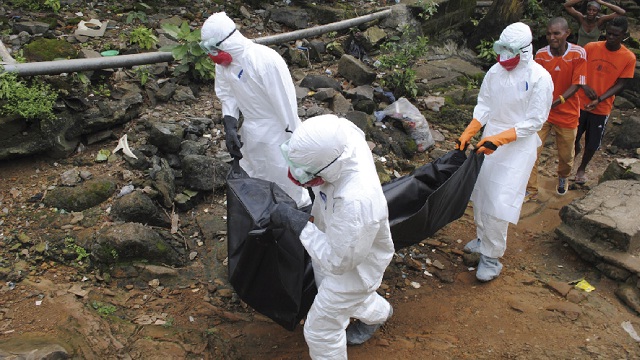
Geneva, Switzerland | AFP | Efforts to curb the Democratic Republic of Congo’s worst Ebola outbreak are stumbling, medical charity MSF warned Thursday, blaming the role of the security forces in the response and their “toxic” relations with local communities.
Seven months into the outbreak, “the Ebola response is failing to bring the epidemic under control,” Doctors Without Borders (MSF) said in a statement.
It highlighted that more than 40 percent of deaths are occurring in communities rather than in Ebola treatment centres.
“That means that we have not reached them and they have not sought our care,” MSF chief Joanne Liu told reporters in Geneva.
The outbreak emerged in North Kivu last August and then spread to neighbouring Ituri province.
It has claimed 561 lives out of 894 recorded cases, according the latest DRC health ministry figures.
Security in eastern DRC, a region rampant with rebel fighters, has complicated the response.
Liu warned that growing reliance on the security services to bring people to treatment centres was spurring hostility.
“The existing atmosphere can only be described as toxic,” she said, adding that this “shows how the response has failed to listen and act on the needs of those most affected.”
Her comments came after MSF suspended its activities at two treatment centres in North Kivu after the sites were attacked.
“Ebola responders are increasingly seen as the enemy,” Liu said.
In the past month alone, she said, there had been more than 30 attacks and incidents involving elements of the Ebola response.
– ‘Counterproductive’ –
An attack by gunmen on one of the centres last week in Butembo forced its temporary closure, but the health ministry said Monday that the centre would reopen.
It also said repairs would begin on the centre in Katwa, North Kivu, which was set ablaze on the night of February 24.
The centre in Butembo, the epicentre of DR Congo’s latest Ebola outbreak, is now run by the health ministry in collaboration with the World Health Organization (WHO) and the UN children’s organisation Unicef, the authorities said.
MSF, which is active across DRC, is considering whether to resume activities in the two areas, but is intent on avoiding the use of security personnel on site or in rounding up patients, Liu said.
“Some local health staff have told us that they live in fear of being associated with the response,” she said, stressing that “the use of coercion adds fuel to this.”
“Using police to force people into complying with health measures is not only unethical. It is totally counterproductive,” she said.
While nearly half of all deaths in the outbreak are happening away from treatment centres, another alarm bell is the fact that more than one third of new cases are occurring outside of known transmission chains.
This “means we don’t know how they got it,” Lieu said.
The lack of control over the spread of Ebola is of serious concern at a time when huge resources are being poured into reining in the virus, and more than 80,000 people have received vaccines.
– ‘Not under control’ –
“We have tools and innovations that previously we only dreamed of … and yet, despite all of this, the signs are that Ebola is not under control,” Lieu said.
She insisted that responders needed to listen more to people’s needs and concerns, and try to offer safe alternatives to those unwilling to be isolated away from their families for long periods of time in treatment centres.
Many on the ground were also frustrated, she said, to see vaccines given only to a small circle of people believed to have had direct or indirect contact with the sick.
And others were angered by the obvious influx of international money to help halt the spread of Ebola as people continue to die from common diseases like malaria due to lack of treatment.
They “feel that Ebola has been used as an excuse for political manoeuvres,” she said.
The ongoing Ebola outbreak is the 10th in DRC’s history and the second largest ever recorded worldwide.
The worst-ever outbreak, which was centred in West Africa from 2013 to 2016, killed more than more than 11,000 people.
 The Independent Uganda: You get the Truth we Pay the Price
The Independent Uganda: You get the Truth we Pay the Price



